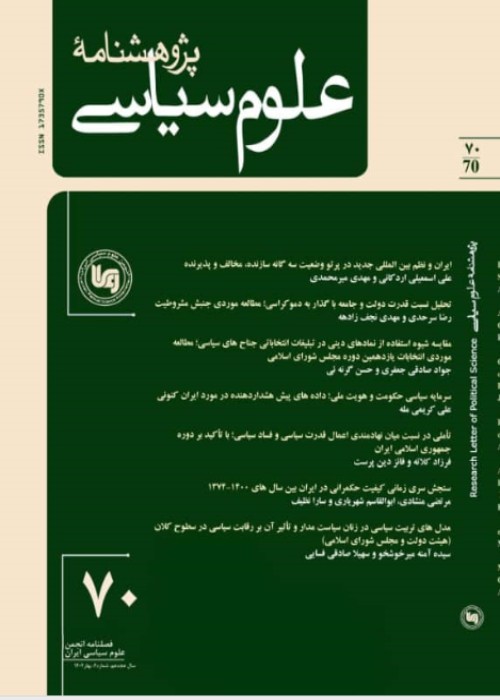Policy-Making on Political Economy of Oil and International Sanctions against Iran
Author(s):
Abstract:
The international political economy of oil is influenced by social, economic and strategic factors. Due to enjoying this natural resource, countries like Iran have been confronted with this rule. During the post-Cold War years, the world experienced an evolution in the structure and processes of the global economy. In the years after the collapse of bipolar structure when the capitalist system gained a more effective stature in the global politics and economics, new forces emerged among the factors affecting the international politics and economics. The political economy of oil can be considered as dependence or isolation of countries as player in global economy system. Thus, countries with oil-oriented economy tend to adopt their strategic policies based on economic requirements and public needs of the global economy. In this regard, Iran situation seems to be completely different. The approval of various bills concerning the economic sanctions against Iran and their enforcement is influenced by a variety of factors such as policy-making on the political economy of oil. There have been different approaches taken by the US, the EU and several industrial nations so as to mitigate the Iranian strategic capabilities. In such circumstances, the US strategic constraints against the Middle Eastern countries and the international system have generally concentrated on the requirements of the global economy. Such requirements have constantly been regarded as the major factor in decision-making on policy-making on oil political economy whenever it came to how the industrial countries should deal with the Middle-east actors including Iran. This paper is a descriptive research in which policy of political economy of oil is independent variable and volatile oil prices and the economic sanctions of the Islamic Republic has been considered as the dependent variable. It also revolves mainly around how the Geneva talks, the negotiations in Vienna as well as the nuclear agreement between Iran and the P5+1 known as the Joint Action Plan are subject to policy-making on political economy of oil. In fact, all the international negotiations and cooperative models are affected by the political economy of policies made by the countries and the international system.
Keywords:
Language:
Persian
Published:
Journal of Political science Association, Volume:10 Issue: 3, 2015
Pages:
171 to 200
magiran.com/p1475424
دانلود و مطالعه متن این مقاله با یکی از روشهای زیر امکان پذیر است:
اشتراک شخصی
با عضویت و پرداخت آنلاین حق اشتراک یکساله به مبلغ 1,390,000ريال میتوانید 70 عنوان مطلب دانلود کنید!
اشتراک سازمانی
به کتابخانه دانشگاه یا محل کار خود پیشنهاد کنید تا اشتراک سازمانی این پایگاه را برای دسترسی نامحدود همه کاربران به متن مطالب تهیه نمایند!
توجه!
- حق عضویت دریافتی صرف حمایت از نشریات عضو و نگهداری، تکمیل و توسعه مگیران میشود.
- پرداخت حق اشتراک و دانلود مقالات اجازه بازنشر آن در سایر رسانههای چاپی و دیجیتال را به کاربر نمیدهد.
دسترسی سراسری کاربران دانشگاه پیام نور!
اعضای هیئت علمی و دانشجویان دانشگاه پیام نور در سراسر کشور، در صورت ثبت نام با ایمیل دانشگاهی، تا پایان فروردین ماه 1403 به مقالات سایت دسترسی خواهند داشت!
In order to view content subscription is required
Personal subscription
Subscribe magiran.com for 70 € euros via PayPal and download 70 articles during a year.
Organization subscription
Please contact us to subscribe your university or library for unlimited access!


